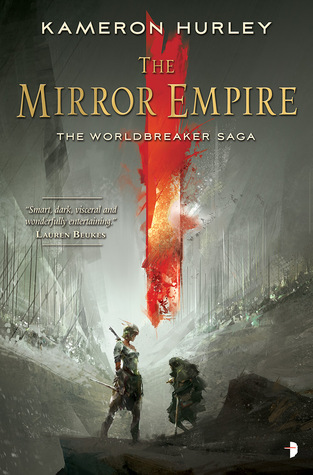
My absolutely favourite review of The Mirror Empire (favourite because it’s just….such white cis man who is scared of of feminist, diverse fantasy type of review) says it is a “female dominated story” with a “complete lack of any strong male characters” and “no heterosexual characters.” And if those aren’t all selling points of a book for you, I don’t even know why you are reading my blog ????
Other selling points: deadly sentient plant life, blood magic, all the genders, sapphic POV character, parallel universes, a female led and driven story, and the typical gore of a Hurley novel.
The Mirror Empire is the first book in Kameron Hurley’s bold, epic, dark fantasy trilogy The Worldbreaker Saga. This is another one of the books that really got me into Kameron Hurley. I’ve said it before and I will say it again, I think that one of Hurley’s strengths is writing about war – the way war affects people, the strategies, the way that war changes people.
I think that too often, books about war can glorify war or the people fighting in a war, but Hurley paints a more accurate picture of war. One where war is bloody, where there is no clear good vs evil, where even the “good guys” can do bad things, and the desperation that can exist on either side of a war. This whole trilogy really works to those themes and I love the complexity that this perspective adds.
The Mirror Empire is a complex book with a slew of POV characters. There were several storylines to follow, and at the beginning I kept getting them confused, but I quickly sorted myself out and I got them all straight.
In thinking back on the series, Lilia (a physically disabled Dhai scullery maid from a parallel universe) tis definitely the main POV character, but Maralah (a Saiduan war minister, assassin, and sinajista), Zezili (a Dorinah general) and her husband Anavha, Taigan (a Saiduan assassin and omajista whose gender cycles through different stages), and Roh (a Dhai novice parajista) all bring interesting and important contributions to the story.
This is a diverse fantasy series with a well developed mythology. The story mainly involves the countries Dhai, Dorinah, and Saiduan. Each of the countries has a different culture and that is quickly seen in the interactions between characters.
I thought that the magic system was well thought out with consistent rules on how the magic could be used. Essentially, certain people are more attuned to one of four celestial bodies from which they can draw power based on their own innate abilities and their training and their abilities differ depending on which satellite they draw their power from.
I also enjoyed the different gender roles and identities of each culture. The Dhai had five genders (Male Assertive, Male Passive, Neutral, Female Passive, and Female Assertive) who were treated pretty much as equal except in specific circumstances like leadership. While women have traditionally been the Khai because if they are able to bear children and heir is more obviously theirs (which can be an issue in the polyamorous relationships that are common in the region). In Saiduan there were three genders, but the gender roles were quite similar to current patriarchal gender roles were women are expected to be subservient and have a hard time breaking into male dominated fields of work. In Dorinah, the gender roles were flipped, with men in the subservient position (men stay at home to raise the children, they aren’t allowed to read or be out on their own lest they get certain ideas).
I loved the world building, the plot held my interest for the whole 600+ pages, and I thought that all of the POV characters had unique motivations. I also liked that not all of the POV characters were good people. They didn’t have to be good to be interesting or realistic.
This is a dark story line with an incoming apocalyptic event, wars, slavery, and death. It might not be for everyone, but I enjoyed it in spite of, or possibly because of, all of these factors. Maybe it is the pessimist in me, but I enjoy grimdark stories and the realities contained in their pages.
Overall, I think this was a great introduction to this complex world, its countries, its characters, its histories and wars, and the way these factors shape the future.
